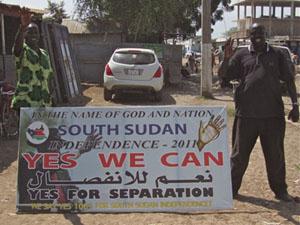Secession challenges for South Sudan
Sudanese man with pro-secession sign. (Photo: Sean Carberry, The World)
This story was first broadcast on PRI’s The World on December 23, 2010. Use audio player above to listen to segment.
In South Sudan, all eyes are anxiously fixed on January 9th. That’s the day the South votes on whether or not to secede from the North. But perhaps more important is what might happen following a vote for independence.
Key to the health of a new country will be the Government of South Sudan’s ability to lead an independent nation and deliver on some very basic infrastructure fundamentals.
A dusty dirt road is what passes for Downtown Bor. It’s the capital of South Sudan’s largest state, called Jonglei. The town is made up largely of bars, cheap hotels, and corrugated steel huts. There’s no electricity, so the hum of generators creates a constant soundtrack.
South Sudan is one the least developed places in the world and Jonglei, which is about the size of Pensylvania, doesn’t have a single paved road.
Judy McCallum runs the NGO, Pact Sudan. She called southern Sudan a “big swamp” where logistics – especially during the rainy season – can make travel next to impossible.
“We had a vehicle stuck in the mud in July and we couldn’t get it out until January the next year. So it’s very hard to do any development. All of our development is based on when you can access the communities and when you can’t.”
The hope in the South, and McCallum said it’s a tragically unrealistic one, is that with independence will come development and prosperity.
“I think the biggest perception is after January tenth next year South Sudan will be independent and will become the land of milk and honey,” she said. “But I think they’re not as aware of the challenges that will face them after, and when they have their own country.”
The South never developed due to decades of civil war with the North. But even in the past 6 years of peace, South Sudan’s semi-autonomous government has yet to really deliver on the much-hoped for peace dividend. Development hasn’t reached very far outside of capital Juba…or, in some cases, even Juba itself.
You need look no further than the Southern Sudan Legislative Assembly. I met there with Bunyoti Adigo Nkwait, the leader of South Sudan’s opposition party.
“Here we are in the Southern Sudan Legislative Assembly, and the power went out since around 2. When it used to happen we had a generator here, but unfortunately I think that generator has broken down, and it’s not being maintained up to now.”
Nkwait said the SPLM, the party that currently runs the semi-autonomous South Sudan, hasn’t delivered on its promises to provide even the most basic public services.
Just look around you, he said. “If I take an example of Juba now at the present moment, there is no good drinking water here. So you see that there are services which we actually need to be delivered to our community so they feel really that they are in peace.”
In the rural state of Jonglei, Governor Kuol Numan Jok said there is an answer to almost any problem facing his state – pavement.
Take Education:
“Where there are no roads they don’t go to school,” he said.
And social services like health care?
“When we build the roads,” he said, “everyone will get the social services they need.”
Even the all-important issue of Security:
“The police are unable to move because there are no roads. And no vehicles can go where there are no roads,” Jok said.
Along the road that connects Bor to the capital of South Sudan, a fleet of dump trucks, rollers, and other earth moving equipment came out recently to smooth the dirt roadway that passes for the main road.
This annual road repair feels a bit like South Sudan’s version of the story of Sisyphus – but for the folks who live along this roadway, the arrival of heavy machinery is a reason to celebrate.
People like You Kot Yot, a self-proclaimed “common businessman.”
Yot is a smartly dressed cattle dealer who uses the road to move livestock. For Yot, no road means no business. Like many here, Yot believes that independence will quickly usher in prosperity.
He said when the South separates, “almost everything will be enough. The roads will be graded and my home life will better. My wife won’t feel so disconnected when I’m away on business.”
Outside the governor’s office in Bor, an elderly man in a khaki suit waited to speak with Governor Jok. Chief Sufri-Ahno leads a village in a part of Jonglei so remote and inaccessible that he couldn’t have driven here if he wanted to. So instead, he hopped a UN flight.
Chief Sufri-Ahno said he’s come to deliver an important message: even though he supports separation, he wants the governor to know that there are no services in his village.
“My place is just a desert; no water; no school; no hospital; food is not there; and roads like this are not there.”
The Governor said these provincial chiefs just have unrealistic expectations. But when services are so scarce, just the sense of inequality is a major threat to the unity of South Sudan.
Judy McCallum of the NGO, PACT Sudan, said it’s always easy to unify when you have a common enemy to fight against.
“When that common enemy goes away, then you see the fractures within your own society.”
Separation from the North alone won’t develop South Sudan’s society – and if the government can’t deliver some basic services, the honeymoon of independence likely won’t last long.
PRI’s “The World” is a one-hour, weekday radio news magazine offering a mix of news, features, interviews, and music from around the globe. “The World” is a co-production of the BBC World Service, PRI and WGBH Boston. More about The World.
